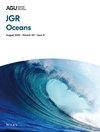Seasonal Variability in Baffin Bay
Abstract
Three dominant characteristics and underlying dynamics of the seasonal cycle in Baffin Bay are discussed. The study is based on a regional, high-resolution coupled sea ice-ocean numerical model that complements our understanding drawn from observations. Subject to forcing from the atmosphere, sea ice, Greenland, and other ocean basins, the ocean circulation exhibits complex seasonal variations that influence Arctic freshwater storage and export. The basin-scale barotropic circulation is generally stronger (weaker) in summer (winter). The interior recirculation (∼2 Sv) is primarily driven by oscillating along-topography surface stress. The volume transport along the Baffin Island coast is also influenced by Arctic inflows (∼0.6 Sv) via Smith Sound and Lancaster Sound with maximum (minimum) in June-August (October-December). In addition to the barotropic variation, the Baffin Island Current also has changing vertical structure with the upper-ocean baroclinicity weakened in winter-spring. It is due to a cross-shelf circulation associated with spatially variable ice-ocean stresses that flattens isopycnals. Greenland runoff and sea ice processes dominate buoyancy forcing to Baffin Bay. Opposite to the runoff that freshens the west Greenland shelf, stronger salinification by ice formation compared to freshening by ice melt enables a net densification in the interior of Baffin Bay. Net sea ice formation in the past 30 years contributes to ∼25% of sea ice export via Davis Strait. The seasonal variability in baroclinicity and water mass transformation changes in recent decades based on the simulation.

 求助内容:
求助内容: 应助结果提醒方式:
应助结果提醒方式:


